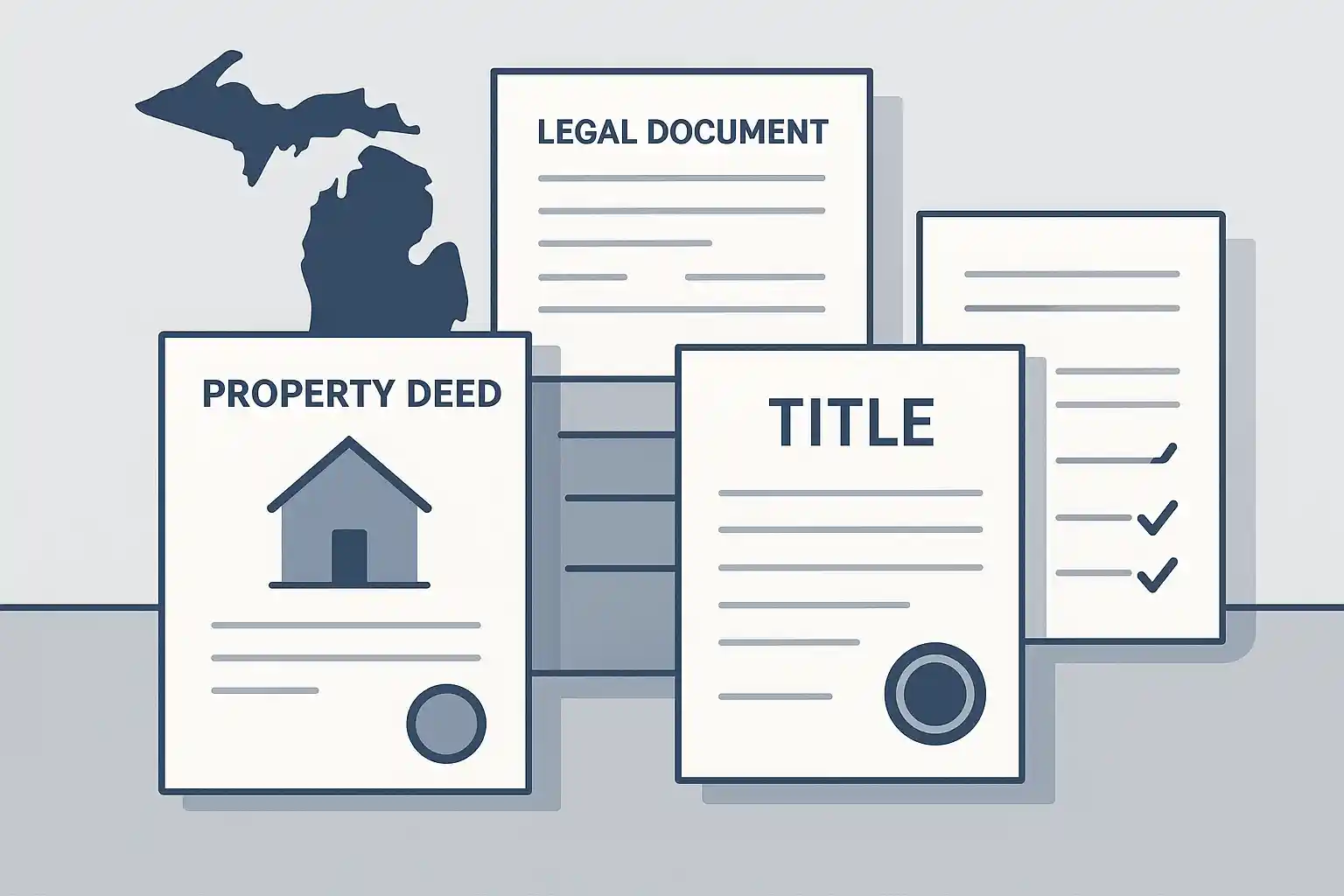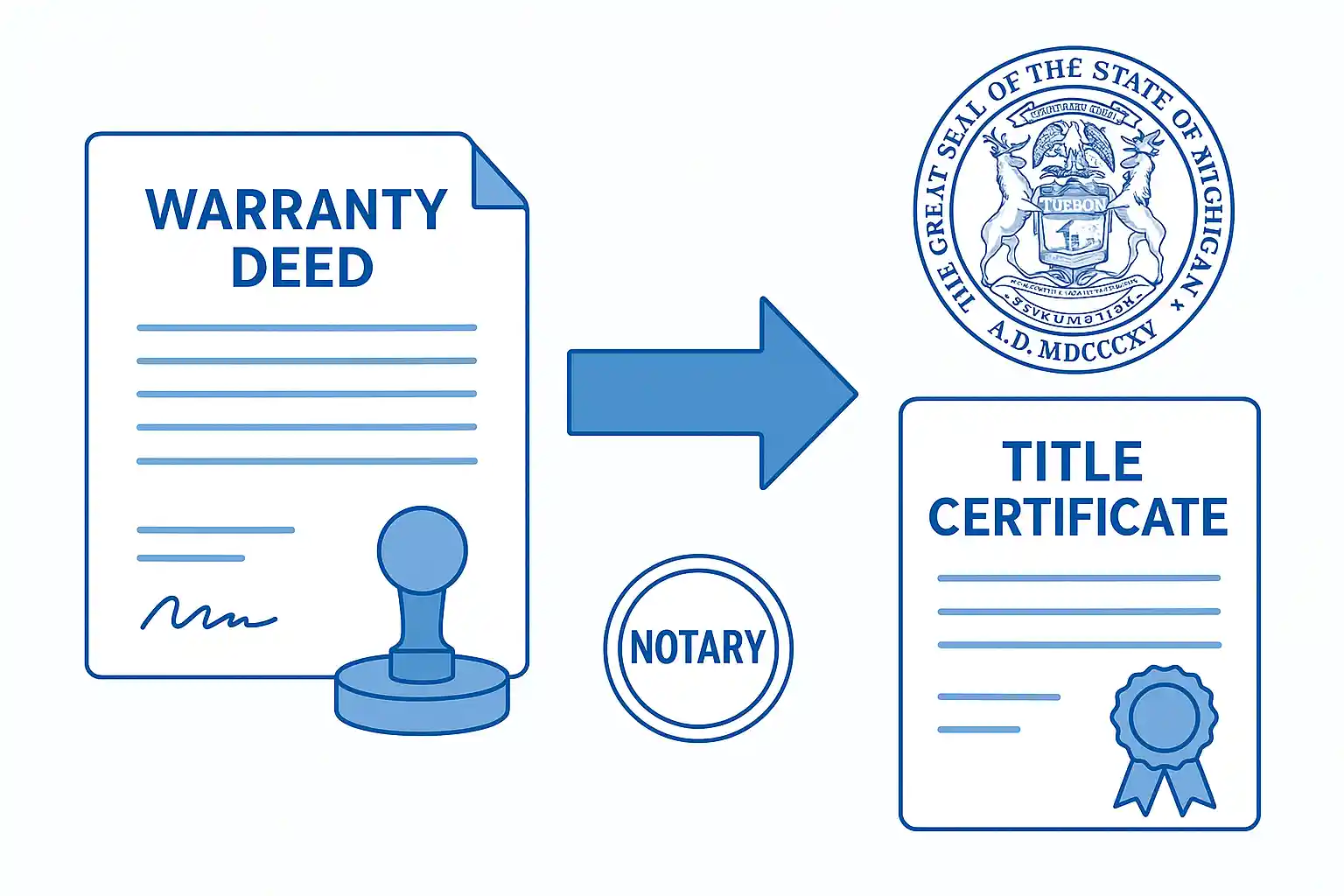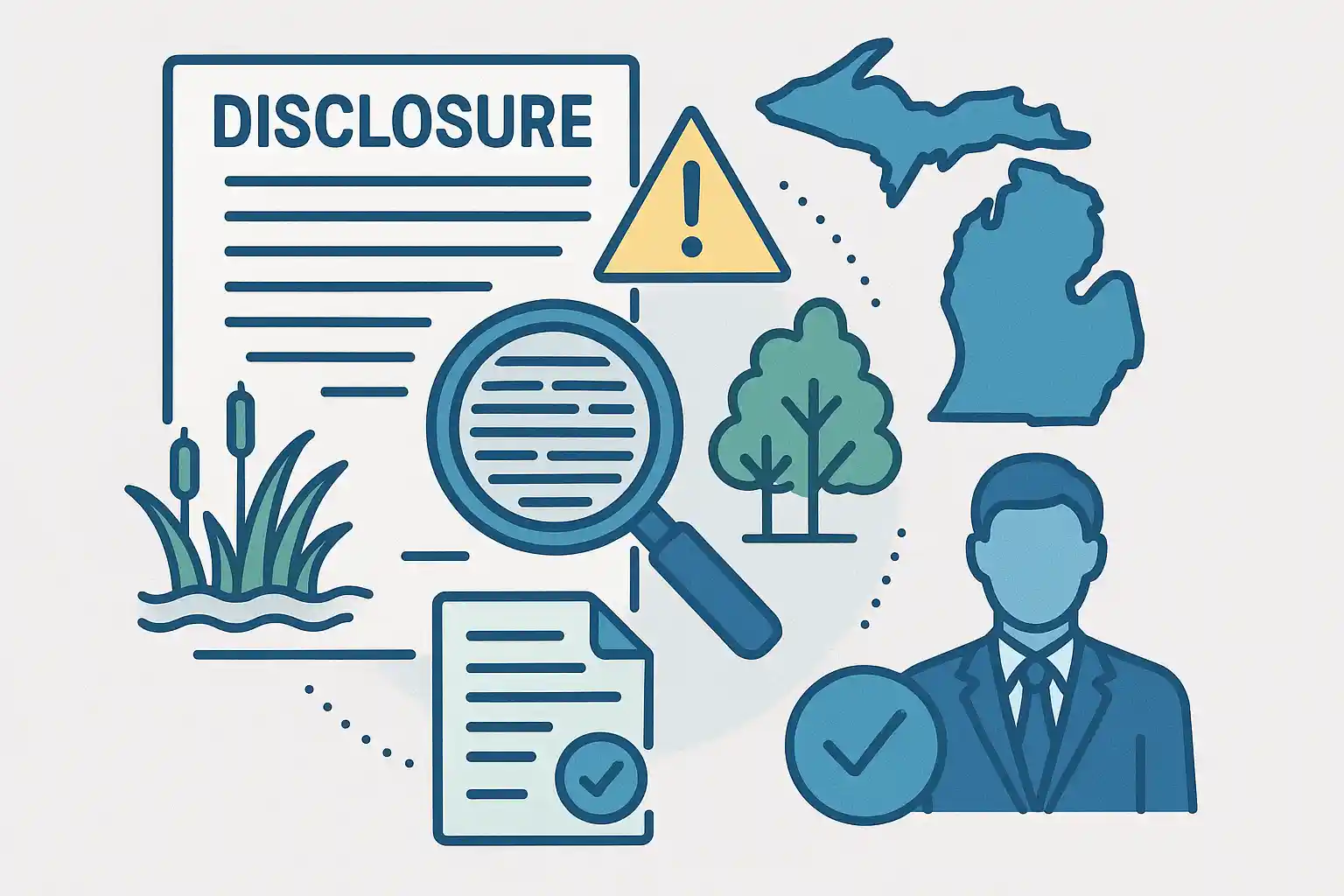Documents for selling land by owner in Michigan include essential deeds, title paperwork, Form 2766 Property Transfer Affidavit, purchase agreements, disclosure statements, and closing documentation. While the process involves complex legal requirements and potential costly mistakes, understanding these documents helps you navigate Michigan's strict compliance standards and avoid expensive errors.
Key Takeaways
- Michigan requires specific deed formats, notarization standards, and Form 2766 Property Transfer Affidavit with exact transfer tax calculations of $3.75 per $500 of property value.
- FSBO sellers must navigate purchase agreements, disclosure obligations, title searches, and closing documentation that often overwhelms property owners with legal complexity.
- Professional cash buyers eliminate all paperwork risks, legal compliance burdens, and documentation mistakes while providing guaranteed closings and full legal protection.
Quick Note: If you'd prefer to avoid the complex documentation process entirely and sell Michigan land for cash, we can provide a free, no-obligation cash offer within 48 hours with zero paperwork headaches.

Essential Legal Documents for Michigan Land Sales
Selling land by owner in Michigan requires careful attention to numerous legal documents that protect both buyer and seller throughout the transaction. Understanding these essential paperwork requirements helps ensure compliance with Michigan law while avoiding costly delays or legal complications.
Michigan Deed Requirements
The deed forms the foundation of any land sale. The state requires a properly executed warranty deed or quitclaim deed that includes the legal description, grantor and grantee information, and consideration paid. Michigan law mandates that all deeds must be signed, witnessed, and notarized before recording with the county Register of Deeds office. The deed must also include a completed Real Estate Transfer Tax Statement (Form 2766) calculating the state transfer tax of $3.75 per $500 of property value.
Title Documentation
The title represents another critical component that many FSBO sellers underestimate. A comprehensive title search through Michigan's county records system reveals any liens, judgments, or encumbrances affecting the property. Title insurance policies protect against undiscovered defects, while an abstract of title provides the complete ownership history. Michigan courts have consistently held sellers liable for undisclosed title defects, making professional title examination essential.
Property Survey and Legal Description
These documents must accurately identify boundaries and easements. Michigan requires surveys to meet specific state standards, including permanent monuments and detailed measurements. A current survey protects against boundary disputes and ensures accurate property descriptions in the deed. The legal description must match county records exactly, as discrepancies can invalidate the entire transaction.
Tax and Assessment Records
Michigan law requires current property tax payments and special assessment disclosure. Sellers must provide tax statements showing all payments current, plus documentation of any pending assessments or tax tribunal appeals. Property tax prorations at closing must follow Michigan's specific calculation methods.
Environmental and Disclosure Documents
These documents may include wetland determinations, septic system inspections, or hazardous material assessments, depending on property type. While Michigan's Seller Disclosure Act primarily applies to residential properties, vacant land sales often trigger additional environmental review requirements.
The complexity of these legal requirements explains why many landowners choose to work with Michigan cash land buyers who handle all documentation professionally, ensuring full legal compliance while eliminating the risk of costly mistakes.

Michigan Deed Requirements and Title Transfer Process
Transferring land ownership in Michigan involves specific legal procedures that must be followed precisely to ensure a valid title transfer. Understanding how to sell Michigan land without a realtor requires navigating these complex documentation requirements while avoiding potential legal challenges.
Michigan Deed Types and Requirements
Michigan recognizes several deed types for land transfers, each offering different levels of protection:
• Warranty Deed: Provides the strongest buyer protection with full title guarantees
• Quitclaim Deed: Transfers only the seller's current interest without warranties
• Special Warranty Deed: Limited guarantees covering only the seller's ownership period
All Michigan deeds must include essential elements mandated by state law. The document requires the grantor and grantee's full legal names, complete property legal description matching county records, and consideration amount. Michigan law requires original signatures with printed names beneath, proper notarization with acknowledgment, and a 2.5-inch top margin on the first page for recording purposes.
Recording and Transfer Tax Process
Form 2766 Property Transfer Affidavit must accompany every land transfer in Michigan, regardless of whether a deed is recorded. This critical document calculates the state real estate transfer tax at $3.75 per $500 of property value. The form requires detailed information about both parties, the sale price, the property description, and the transfer circumstances. Read more about tax consequences of selling land in Michigan.
County recording fees vary across Michigan but typically range from $10 to $30 for the first page plus additional fees for subsequent pages. Many counties now offer electronic recording systems that can expedite the process, though original signatures remain mandatory for most deed types.
Title Search and Insurance Considerations
Professional title searches examine Michigan's county records to identify any liens, judgments, or encumbrances affecting the property. This process typically costs $200-500 but protects against significant financial liability from undiscovered title defects.
Michigan title insurance policies provide one-time protection against title problems not revealed in public records. While not legally required, most buyers and lenders demand title insurance coverage, making it practically essential for successful land sales.
The complexity of Michigan's deed requirements and title transfer process often overwhelms FSBO sellers. Working with experienced professionals eliminates these documentation challenges, as professionals handle all legal compliance requirements and ensure error-free title transfers.

Purchase Agreements and Contracts for Michigan Land
Creating a legally binding purchase agreement for Michigan land requires careful attention to state-specific requirements and essential contract provisions. FSBO sellers must understand these critical elements to protect their interests and ensure enforceable transactions.
Essential Contract Components
Michigan purchase agreements must include specific elements to create valid, enforceable contracts. The document requires complete identification of both parties with full legal names and addresses, accurate property legal description matching county records, and clear purchase price terms including payment methods, cost of your Michigan land, and financing arrangements.
Key provisions every Michigan land purchase agreement needs:
• Property boundaries and included improvements or fixtures
• Closing date and location specifications
• Title requirements and who pays for title insurance
• Property tax proration calculations and responsibility
• Default remedies and liquidated damages clauses
The purchase price section demands particular attention in land transactions. Unlike residential sales, vacant land often involves creative financing arrangements, mineral rights considerations, or development restrictions that require detailed contractual language.
Contingency Clauses and Timeline Management
Common contingencies in Michigan land sales protect both buyers and sellers by establishing specific conditions that must be met before closing. Financing contingencies typically allow 30-45 days for buyer loan approval, while inspection periods for environmental assessments or surveys generally range from 10-21 days.
Due diligence periods give buyers time to verify zoning compliance, access rights, and utility availability. Michigan law doesn't mandate specific contingency timeframes, making proper deadline management crucial for successful transactions. Missing contingency deadlines can result in contract termination or breach of contract claims.
Earnest Money and Default Provisions
While Michigan doesn't legally require earnest money deposits, they're practically essential for demonstrating buyer commitment. Typical deposits range from 1-5% of the purchase price, held in escrow until closing. The purchase agreement must specify who holds deposits and under what conditions they're refundable or forfeited.
Default provisions require careful drafting to protect seller interests while remaining legally enforceable. Michigan courts scrutinize liquidated damages clauses, requiring them to represent reasonable estimates of actual damages rather than penalties.

Michigan Disclosure Requirements and Legal Obligations
Michigan's disclosure laws for land sales create specific obligations that FSBO sellers must understand to avoid legal liability. While vacant land transactions face fewer disclosure requirements than residential properties, important obligations still apply, for example when selling Michigan recreational land, that can significantly impact the sale process.
Understanding Michigan's Seller Disclosure Act
Michigan's Seller Disclosure Act primarily applies to residential properties, but certain provisions extend to land transactions involving improvements or specific conditions. When selling vacant land, sellers aren't typically required to complete the standard residential disclosure form. Still, they remain legally obligated to disclose any known material defects or conditions that could affect the property's value or intended use.
The Act requires explicit disclosure of property tax obligations, as Michigan law states that "real property tax obligations can change significantly when property is transferred." This warning must appear in all property transfer documents and alert buyers to potential assessment increases following ownership changes.
Mandatory Disclosure Categories for Land Sales
Environmental and regulatory disclosures represent the most critical area for Michigan land transactions. Sellers must disclose known environmental hazards, contamination issues, or regulatory violations affecting the property.
Key disclosure areas for Michigan land sales include:
• Wetland locations and protection requirements under Part 303 of NREPA
• Known soil contamination or environmental remediation obligations
• Flood zone designations and drainage issues
• Zoning violations or non-conforming use situations
• Utility availability and connection costs
Mineral Rights and Access Considerations
Michigan law requires disclosure of severed mineral rights, as these can be sold separately from surface rights. Sellers must inform buyers whether mineral rights are conveyed with the property or remain with previous owners or third parties. This disclosure prevents future disputes when mining companies exercise subsurface rights.
Access rights and easements demand careful attention in land transactions. Sellers must disclose existing easements, right-of-way agreements, or access limitations that could affect the buyer's intended property use. Michigan courts have held sellers liable for failing to disclose access restrictions that substantially impact property value.
Property Tax and Assessment Obligations
Property transfer triggers potential reassessment under Michigan's uncapping provisions. While specific tax amounts can't be predicted, sellers must warn buyers that assessed values may increase significantly after transfer, particularly for properties held long-term with capped assessments.

Closing Documentation and Final Paperwork in Michigan
The closing process for Michigan land sales involves extensive documentation that must be completed accurately to finalize the property transfer. Understanding these requirements helps FSBO sellers prepare for the complex paperwork demands of closing day.
Settlement Statement Requirements
Michigan land closings require comprehensive settlement statements that itemize all financial aspects of the transaction. While residential sales typically use HUD-1 Settlement Statements or Closing Disclosure forms, land transactions often utilize customized settlement statements prepared by title companies or closing attorneys.
The settlement statement must accurately reflect all agreed-upon terms from the purchase agreement, including purchase price, earnest money credits, and closing cost allocations. Michigan law requires specific calculations for property tax prorations, which follow the state's Property Tax Act provisions. Property taxes are typically prorated based on the tax year, with sellers responsible for their ownership period and buyers assuming responsibility from the closing date forward.
Required Closing Documents
Essential documents for Michigan land closing include:
• Executed warranty deed or quitclaim deed with proper legal description
• Title insurance policy and commitment letters
• Settlement statement with all financial calculations
• Form 2766 Property Transfer Affidavit for state transfer tax
• Survey documents and property boundary certificates
• Lien releases and payoff statements for existing encumbrances
Notarization and Recording Process
Michigan requires all deed transfers to include proper notarization with acknowledgment statements. The notary must verify the grantor's identity and witness the signature on the closing date. Documents executed in Michigan after 1997 must meet specific formatting requirements, including a 2.5-inch top margin on the first page and adequate space for recording stamps.
The completed deed and Form 2766 must be recorded with the county Register of Deeds office within a reasonable time after closing. Recording fees vary by county but typically range from $10 to $30 for the first page plus additional fees for multiple pages. Electronic recording is available in many Michigan counties, though original signatures remain mandatory.
Final Financial Calculations
Property tax prorations represent one of the most complex aspects of Michigan closings. The state requires specific proration methods that may differ from other states, particularly regarding summer tax bills and winter tax calculations. Title companies typically handle these calculations, but FSBO sellers must understand the process to verify accuracy.
Transfer tax calculations must be precise, as Michigan imposes penalties for underpayment. The state transfer tax of $3.75 per $500 of value requires exact calculation, with additional county transfer taxes varying by location.
Avoiding Legal Pitfalls: How Prime Land Buyers Handle All Paperwork
The complexity of Michigan's legal documentation requirements creates significant risks for FSBO land sellers. Understanding these challenges helps explain why many property owners choose professional land cash buyers who eliminate documentation burdens and legal compliance concerns.
The Hidden Costs of DIY Legal Documentation
Michigan FSBO sellers face substantial financial exposure from documentation errors that aren't immediately apparent. A recent survey found that 10% of FSBO sellers struggle with required paperwork, with mistakes often leading to costly legal disputes or transaction failures.
Common expensive errors include improperly executed deeds that fail to transfer clear title, incorrectly calculated transfer taxes resulting in state penalties, and missing disclosure requirements that create ongoing liability. Attorney fees for correcting these mistakes typically range from $2,500-$7,500, often exceeding the commission savings FSBO sellers hoped to achieve.
Professional Legal Requirements and Time Investment
Essential professional services for compliant Michigan land sales include:
• Real estate attorney consultation and document review ($1,500-$3,000)
• Title company services and title insurance ($800-$1,500)
• Survey and boundary verification ($500-$2,000)
• Environmental assessments when required ($1,000-$5,000)
• Closing coordination and document preparation ($500-$1,200)
The time investment proves equally demanding. FSBO sellers typically spend 40-60 hours managing documentation, coordinating with multiple professionals, and ensuring compliance with Michigan's complex requirements. This substantial time commitment often overwhelms busy property owners already dealing with their primary occupations and responsibilities.
Legal requirements become even more complex when dealing with inherited property. If you've inherited land in Michigan, you'll face additional probate court requirements, multiple heir considerations, and specific tax implications. Our comprehensive guide on how to sell inherited land in Michigan covers the unique documentation and legal steps required for estate property sales.
Why Cash Buyers Eliminate These Challenges
At Prime Land buyers, we help landowners eliminate all documentation risks and time demands for sellers.
We maintain relationships with experienced Michigan real estate attorneys, title companies, and closing professionals who understand state-specific requirements. This network ensures proper handling of all legal documentation while protecting sellers from potential liability exposure.
The Prime Land Buyers Advantage
Prime Land Buyers transforms the complex documentation process into a simple, hassle-free experience. Their team handles all legal paperwork, coordinates with title companies, and ensures full compliance with Michigan requirements. Sellers receive guaranteed cash offers without fees, commissions, or documentation responsibilities.
The company's mission of making land sales "fast, simple, and hassle-free" directly addresses the documentation challenges that overwhelm FSBO sellers. With over 62 landowners receiving cash offers weekly and a 5-star rating from 40+ reviews, Prime Land Buyers demonstrates the value of professional documentation handling.
Ready to skip the paperwork headaches? Get a cash offer for your Michigan land today and let Michigan's trusted land buying professionals handle all legal documentation while you focus on your next chapter.

